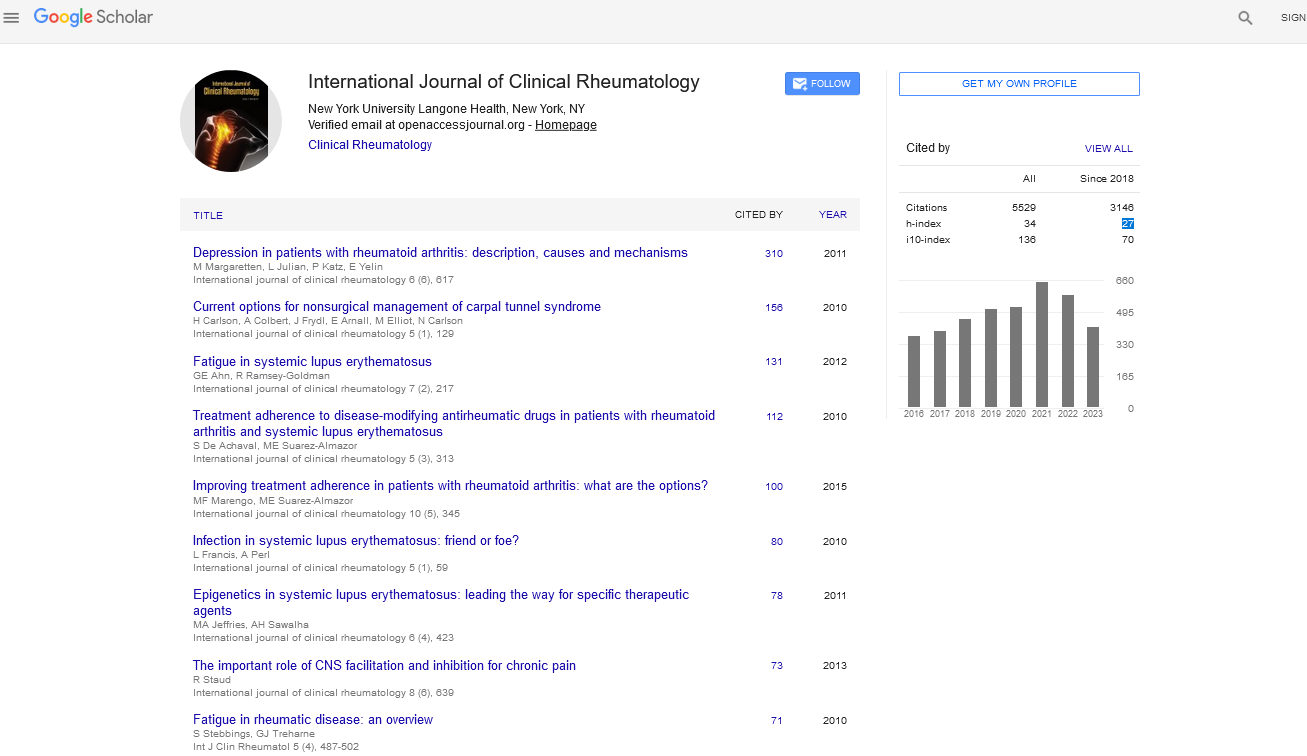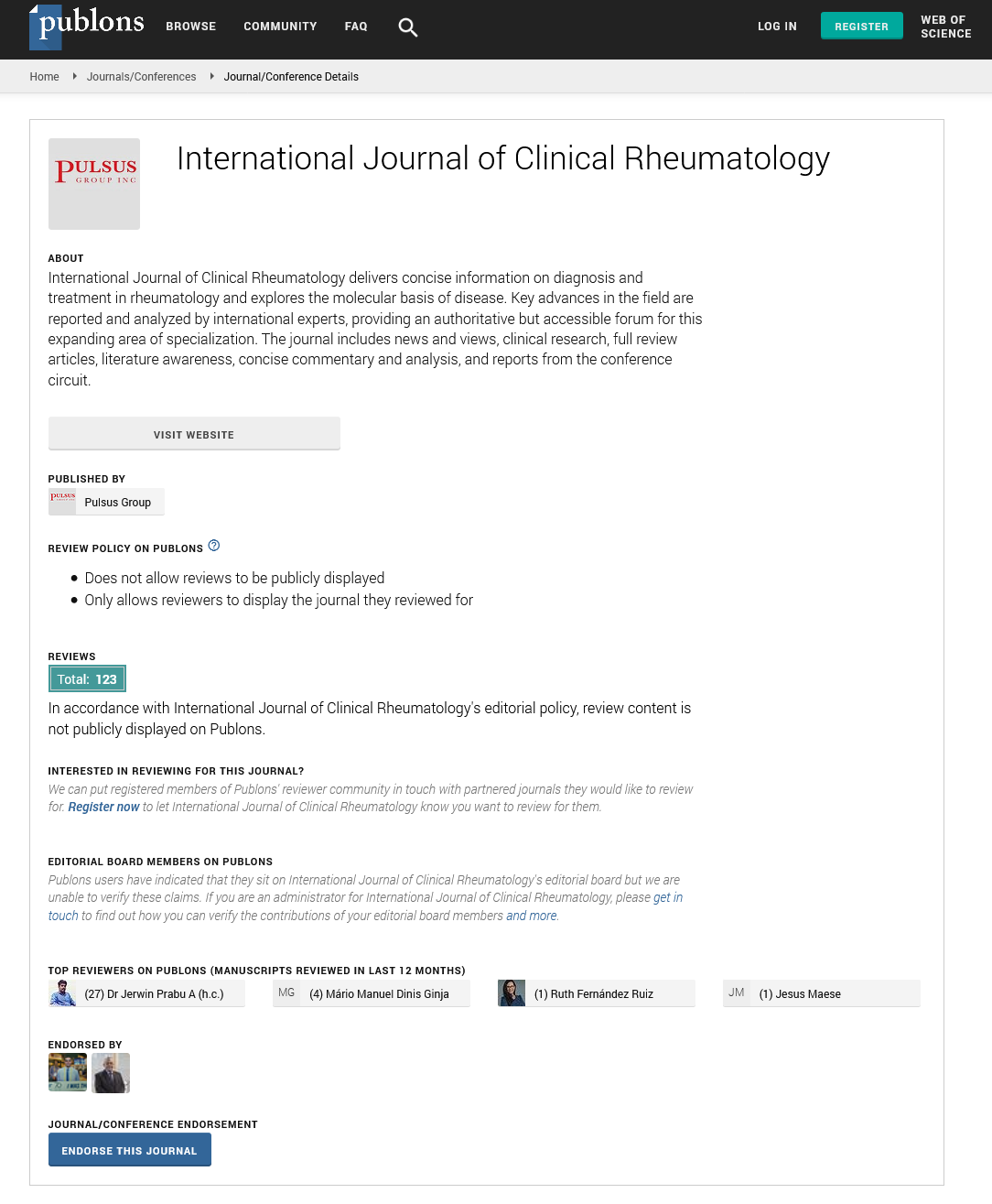Perspective - International Journal of Clinical Rheumatology (2024) Volume 19, Issue 11
The Impact of Vitamin D Deficiency on Autoimmune Disease Activity: A Comprehensive Meta-Analysis
Olivia Harris *
Department of Rheumatology, Pontificia Universidad Católica de Chile, Santiago, Chile
- *Corresponding Author:
- Olivia Harris
Department of Rheumatology, Pontificia Universidad Católica de Chile, Santiago, Chile
E-mail: olivia.harris1988@protonmail.com
Received: 02-Nov-2024, Manuscript No. fmijcr-25-157432; Editor ssigned: 04-Nov-2024, Pre-QC No. fmijcr-25-157432 (PQ); Reviewed: 18-Nov-2024, QC No. fmijcr-25-157432; Revised: 23- Nov-2024, Manuscript No. fmijcr-25-157432 (R); Published: 30- Nov-2024, DOI: 10.37532/1758-4272.2024.19(9). 316-319
Abstract
Vitamin D deficiency has been increasingly linked to the exacerbation of various autoimmune diseases, including rheumatoid arthritis, multiple sclerosis, and systemic lupus erythematosus. This meta-analysis consolidates findings from clinical studies investigating the relationship between vitamin D levels and autoimmune disease activity. Results from over 40 studies suggest a significant inverse correlation between serum vitamin D concentrations and disease activity markers in autoimmune conditions. This review underscores the potential role of vitamin D supplementation as an adjunct therapy to improve disease control and reduce flare-ups, although further large-scale randomized controlled trials are necessary to establish definitive clinical guidelines.
Keywords
Vitamin D deficiencyâ Autoimmune diseasesâ Rheumatoid arthritisâ Multiple sclerosisâ Lupus erythematosusâ Disease activityâ Supplementation
Introduction
Vitamin D is a vital fat-soluble nutrient that plays a critical role in maintaining bone health, immune system function, and overall metabolic processes. It is produced in the skin upon exposure to ultraviolet B (UVB) rays from sunlight and can also be obtained from dietary sources or supplements. Recent studies have revealed a broader role for vitamin D, particularly in modulating immune responses and influencing the pathogenesis of autoimmune diseases (AIDs), such as rheumatoid arthritis (RA), multiple sclerosis (MS), systemic lupus erythematosus (SLE), and type 1 diabetes. Autoimmune diseases are characterized by the immune system mistakenly attacking the body’s own tissues, leading to chronic inflammation and tissue damage. A growing body of evidence suggests that vitamin D deficiency may be a key factor influencing the severity and progression of autoimmune diseases. Given vitamin D’s role in immune system modulation, deficiency in this nutrient has been hypothesized to exacerbate autoimmune disease activity by affecting both innate and adaptive immunity. Autoimmune diseases tend to have higher prevalence rates in regions with lower sunlight exposure, which suggests a potential link between insufficient vitamin D levels and the incidence of these conditions. This comprehensive meta-analysis aims to synthesize the existing research on the relationship between vitamin D deficiency and autoimmune disease activity, evaluating how low levels of vitamin D may influence the course of various autoimmune conditions. By analyzing data from multiple studies, this review seeks to provide a clearer understanding of the potential mechanisms by which vitamin D deficiency could impact autoimmune disease activity, and whether correcting this deficiency might offer therapeutic benefits [1-4].
Discussion
Vitamin D and immune system function: Vitamin D plays a fundamental role in regulating immune responses. It influences the function of immune cells, including T cells, B cells, macrophages, and dendritic cells. The active form of vitamin D, calcitriol, binds to the vitamin D receptor (VDR) found on immune cells, modulating their activity. This interaction helps in controlling inflammatory responses, and it has been shown that vitamin D deficiency can lead to overactive immune responses, a hallmark of autoimmune diseases. The immune system can be categorized into two primary branches: the innate and adaptive immune systems. Vitamin D affects both systems, balancing the immune response to prevent excessive inflammation while promoting the immune system's ability to fight infections. In the context of autoimmune diseases, vitamin D deficiency can shift the immune response toward a pro-inflammatory state, which may drive the activation of autoreactive T cells and the production of autoantibodies. Studies have shown that vitamin D deficiency is associated with increased levels of inflammatory cytokines such as IL-6, TNF-α, and interferon-gamma, which can worsen disease symptoms in autoimmune conditions [5].
Impact of Vitamin D deficiency on specific autoimmune diseases: Recent meta-analyses and clinical studies have suggested that vitamin D deficiency may influence the progression and activity of various autoimmune diseases. Below, we explore the role of vitamin D deficiency in some common autoimmune conditions.
Rheumatoid arthritis (RA): RA is a chronic inflammatory disease characterized by synovial joint inflammation, leading to pain, stiffness, and deformities. Vitamin D deficiency has been implicated in the exacerbation of RA symptoms, as low vitamin D levels have been linked to increased disease activity and poorer clinical outcomes. In RA patients, vitamin D deficiency may influence the production of pro-inflammatory cytokines and promote the activation of autoreactive T cells. Studies have shown that supplementation with vitamin D can improve disease activity scores and reduce markers of inflammation in RA patients, although the exact therapeutic benefits are still under investigation [6].
Multiple sclerosis (MS): MS is a neurological autoimmune disease that leads to demyelination of nerve fibers in the central nervous system (CNS). There is strong evidence supporting the link between vitamin D deficiency and MS, with individuals living in regions with low sunlight exposure having a higher risk of developing the disease. Vitamin D has been shown to play a protective role in MS by influencing immune cell differentiation and inhibiting the activation of autoreactive T cells. Meta-analyses have demonstrated that individuals with MS have significantly lower serum levels of vitamin D compared to healthy controls. Some studies have also indicated that vitamin D supplementation may reduce relapse rates and slow disease progression in MS, though further clinical trials are needed to confirm these findings [7].
Systemic lupus erythematosus (SLE): SLE is a systemic autoimmune disease that affects multiple organs, including the skin, kidneys, and joints. Vitamin D deficiency is common among individuals with SLE and has been associated with disease flares, renal involvement, and increased risk of cardiovascular complications. In SLE patients, low levels of vitamin D may exacerbate the autoimmune response by promoting the activation of B cells and the production of autoantibodies. Vitamin D supplementation has been shown to have beneficial effects on disease activity and markers of inflammation in SLE, although its role as a standalone treatment remains inconclusive.
Type 1 Diabetes (T1D): Type 1 diabetes is an autoimmune disorder in which the immune system attacks insulin-producing beta cells in the pancreas. Low levels of vitamin D have been linked to an increased risk of developing T1D, particularly in individuals with a genetic predisposition. The immunomodulatory effects of vitamin D may help prevent autoimmune destruction of pancreatic cells by regulating the balance between pro-inflammatory and regulatory T cells. While vitamin D supplementation has not been conclusively shown to prevent or reverse T1D, it may help improve beta-cell function and glycemic control in individuals with the disease.
Meta-Analysis of Vitamin D Deficiency and Autoimmune Disease Activity
The results of various meta-analyses investigating the link between vitamin D deficiency and autoimmune disease activity are consistent in showing a significant association. A meta-analysis of studies on RA, MS, SLE, and T1D found that individuals with these conditions tend to have lower levels of vitamin D compared to healthy controls, with deficiency correlating with increased disease activity. In RA, low vitamin D levels were associated with higher disease activity scores and increased levels of pro-inflammatory cytokines. In MS, vitamin D deficiency was linked to increased relapse rates and greater disability. The data from these meta-analyses also suggest that correcting vitamin D deficiency may improve disease outcomes. In RA, vitamin D supplementation was associated with a reduction in disease activity and improved joint function. Similarly, MS patients who received vitamin D supplementation demonstrated a decrease in relapse rates and a slower progression of disability. In SLE, vitamin D supplementation helped reduce disease flares and improve kidney function. These findings support the hypothesis that vitamin D plays a protective role in autoimmune diseases by modulating immune function and controlling inflammation. However, the evidence regarding the therapeutic effects of vitamin D supplementation remains mixed in some diseases, as not all studies have shown significant benefits. The heterogeneity in the results may be due to differences in study design, dosage of vitamin D supplementation, and the duration of follow-up. Further high-quality, large-scale randomized controlled trials are needed to determine the precise role of vitamin D supplementation in managing autoimmune diseases and its potential as an adjunct to standard treatments [8-10].
Potential Mechanisms of Vitamin D in Autoimmune Disease Modulation
The precise mechanisms by which vitamin D affects autoimmune disease activity are not fully understood but are thought to involve several pathways. Vitamin D’s effects on immune cells are primarily mediated through the VDR, which influences gene expression involved in immune responses. Vitamin D has been shown to inhibit the differentiation and activation of Th17 cells, which are implicated in the pathogenesis of autoimmune diseases such as RA and MS. Additionally, vitamin D promotes the development of regulatory T cells (Tregs), which help maintain immune tolerance and prevent autoimmunity. These immune-modulating effects of vitamin D may explain why deficiency is associated with increased disease activity in autoimmune diseases. Another potential mechanism is the effect of vitamin D on the gut microbiome. Vitamin D receptors are present in gut cells, and vitamin D has been shown to influence the composition of the gut microbiome, which plays a critical role in immune system regulation. An imbalance in the gut microbiota may contribute to the development of autoimmune diseases, and vitamin D may help restore microbiome balance, thus modulating the immune system.
Conclusion
In conclusion, vitamin D deficiency appears to play a significant role in the pathogenesis and activity of autoimmune diseases. Meta-analyses and clinical studies have consistently shown that low vitamin D levels are associated with increased disease activity and worse clinical outcomes in conditions such as rheumatoid arthritis, multiple sclerosis, systemic lupus erythematosus, and type 1 diabetes. The immunomodulatory effects of vitamin D, including the regulation of T cell differentiation and cytokine production, suggest that correcting vitamin D deficiency could be a valuable therapeutic strategy in managing these diseases. While vitamin D supplementation shows promise in improving disease activity and reducing inflammation, more high-quality clinical trials are needed to establish optimal dosing regimens and assess the long-term effects of vitamin D in autoimmune disease management. Given the widespread prevalence of vitamin D deficiency and its potential role in autoimmune disease modulation, public health initiatives to improve vitamin D levels, particularly in populations at high risk for autoimmune diseases, could have significant clinical and therapeutic implications.
References
- Wu YH, Wu YR, Li B, Yan ZY(2020) Cryptotanshinone A review of its pharmacology activities and molecular mechanisms. Fitoterapia 145: 104633.
- Li H, Gao C, Liu C, Liu L, Zhuang J, et al. (2021) A review of the biological activity and pharmacology of cryptotanshinone, an important active constituent in Danshen. Biomed Pharmacother 137: 111332.
- Chen ZM, Huang L, Li MM, Meng L, Ying SC, et al. (2018) Inhibitory effects of isocryptotanshinone on gastric cancer. Sci rep 8: 9307.
- Wang J, Zhang G, Dai C, Gao X, Wu J, et al. (2017) Cryptotanshinone potentiates the antitumor effects of doxorubicin on gastric cancer cells via inhibition of STAT3 activity. J Int Med Res 45: 220-230.
- Wang Y, Lu HL, Liu YD, Yang LY, Jiang QK, et al. (2017) Cryptotanshinone sensitizes antitumor effect of paclitaxel on tongue squamous cell carcinoma growth by inhibiting the JAK/STAT3 signaling pathway. Biomed Pharmacother 95: 1388-1396.
- Shen L, Zhang G, Lou Z, Xu G, Zhang G (2017) Cryptotanshinone enhances the effect of Arsenic trioxide in treating liver cancer cell by inducing apoptosis through downregulating phosphorylated- STAT3 in vitro and in vivo. BMC Complement Altern Med 17: 106.
- Chakrabarti S, Wintheiser G, Tella SH, Oxencis C, Mahipal A (2021) TAS-102: A resurrected novel Fluoropyrimidine with expanding role in the treatment of gastrointestinal malignancies. Pharmacol ther 224: 107823.
- Lenz HJ, Stintzing S, Loupakis F (2015) TAS-102, a novel antitumor agent: a review of the mechanism of action. Cancer treat rev 41: 777-783.
- Vodenkova S, Buchler T, Cervena K, Veskrnova V, Vodicka P, et al. (2020) 5-fluorouracil and other fluoropyrimidines in colorectal cancer: Past, present and future. Pharmacol ther 206: 107447.
- Emura T, Suzuki N, Yamaguchi M, Ohshimo H, Fukushima M (2004) A novel combination antimetabolite, TAS-102, exhibits antitumor activity in FU-resistant human cancer cells through a mechanism involving FTD incorporation in DNA. Int J Oncol 25: 571-578.
Indexed at, Google Scholar, Crossref
Indexed at, Google Scholar, Crossref
Indexed at, Google Scholar, Crossref
Indexed at, Google Scholar, Crossref
Indexed at, Google Scholar, Crossref
Indexed at, Google Scholar, Crossref
Indexed at, Google Scholar, Crossref
Indexed at, Google Scholar, Crossref
Indexed at, Google Scholar, Crossref


